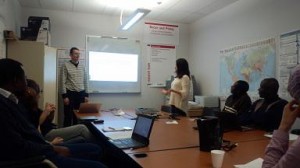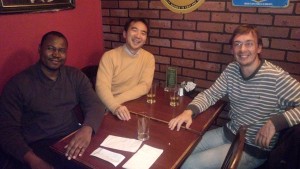特別セミナー「アジャイル品質とソフトウェアパターン」 2月22日
世界最大級のパターンコミュニティHillside Group代表でありアジャイル開発
やパターン、さらにはソフトウェアアーキテクチャについて著名なJoseph Yoder
氏をお招きして、アジャイル品質とソフトェアパターンに関する特別セミナーを
開催します。セミナーではYoder氏より、ソフトウェアのアジャイル開発を進め
ていく際の品質の捉え方、品質保証のあり方をパターン集としてまとめた
「Quality Assurance to Agile Quality」を詳しく紹介いただきます。さらに参
加者を交えたワークショップ形式で、それらのパターンの関係を探るとともに、
周辺のパターン候補を検討します。
また早稲田大学からは、アジャイル開発に対する幾つかの取り組みをご紹介する
とともに、ソフトウェア信頼性予測のプロジェクト進行中の動的な活用について
詳しくご説明します。参加費無料、登録不要です。ぜひご参加ください。
主催: 早稲田大学グローバルソフトウェアエンジニアリング研究所(スーパー
グローバル大学創成支援 SGU Waseda Ocean ICT・ロボット工学拠点 参画)
日時: 2016年2月22日(月)18:00-20:00
場所: 早稲田大学グリーンコンピューティング研究開発センター 1階
セミナー室(東京メトロ 東西線・早稲田駅)
地図: http://www.waseda.jp/inst/gcs/access/
参加費: 無料
参加申込: 不要です。会場まで直接お越しください。
プログラム(予定):
18:00-18:10
“アジャイル開発へのソフトウェア工学的アプローチ: イテレーション期間と学
習ワークショップ”
(国際会議 Agile’12, Agile’13 発表)(日本語講演)
鷲崎 弘宜(早稲田大学グローバルソフトウェアエンジニアリング研究所所長)
アジャイル開発のシミュレーションを通じた最適なイテレーション機関の予測
手法、ならびに、ワークショップを通じたアジャイルマインドの学習効果を
実験的に確認した結果について概要をご紹介します。
18:10-18:25
“ソフトウェア信頼性予測のプロジェクト進行中の動的な活用”(予定)
(国際会議 Agile’15, ISSRE’15 発表)(日本語講演)
本田 澄(早稲田大学グローバルエデュケーションセンター助手、
グローバルソフトウェアエンジニアリング研究所 研究所員)
ソフトウェア信頼性成長曲線の考え方を、進行中のソフトウェア開発プロジェ
クトに適用することでリリース予測やリスク検知に用いる方法をご紹介します。
18:25-19:10
“QA to AQ: Shifting from Quality Assurance to Agile Quality”
(国際会議 SugarLoafPLoP’14, PLoP’15, AsianPLoP’16 ほか発表)
(英語講演、質疑 日英可)
Joseph Yoder(Hillside Group, Inc. 代表)
As organizations move to being more agile, it is important that this
transition also includes Quality Assurance (QA). An important principle
in most agile practices is the “Whole Team” concept. It isn’t just
testers who care about quality, the whole team does. Agile developers
write unit tests to exercise system functionality, but there is much
more to quality than testing system functionality. Ideally, agile
quality involves a cross-functional agile team, with special expertise
contributed by testers and quality engineers. Therefore having QA be a
part of the team from the start can enhance efforts to build quality
into the system and make attention to quality an integral activity of a
more streamlined process. The whole team focuses on quality while
delivering functionality. We have currently identified 24 patterns for
Being Agile at Quality. Right now our patterns are a collection which we
organize into these areas: identifying system qualities, making
qualities visible, fitting quality into your process, and being agile at
quality assurance. We have also identified 15 additional pattern
candidates that might become part of the pattern language.
19:10-20:00
Workshop: Towards a Pattern Language for Agile Quality
(アジャイル品質パターンの関連付けと周辺パターン候補発見の試み)
ファシリテータ: Joseph Yoder、鷲崎 弘宜(日英 併用)
本ワークショップでは、アジャイル品質の24のパターン集「QA to AQ」における
各パターンをワークショップ形式で関連付けることを試み、パターンのマップを
得ることを目標とします。さらにその過程で、新たなパターン候補を探ります。
Ultimately we look at evolving these patterns into a pattern language
with many relationships between the patterns and a pattern map for the
language. The goal of this workshop is to brainstorm how the 24
patterns relate, possibly leading to a pattern map. This might lead to
finding gaps in our existing patterns or seeing how the 15+ pattern
candidates fit into the pattern language. Moreover we would seek new
pattern candidates for the pattern language.

